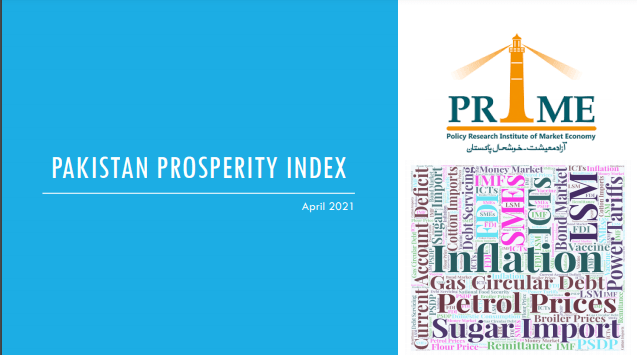
Policy Research Institute of Market Economy (PRIME) released its report on Pakistan Prosperity Index (PPI) which is a monthly review of Pakistan’s macro-economy based on the analysis of four periodic data sets precisely, Trade Volume (TV), Consumer Price Index (CPI), Quantum Index of Large-Scale Manufacturing Industries (QIM) and Long-Term Financing Facility (LTFF).
The financial and business uncertainties of 2020 have been carried forward in 2021 across the globe. This has been the case for Pakistan also as the latest Prosperity Index reveals a reversal of country’s nascent economic rebound. As per the report, after a five-month high, Pakistan Prosperity Index (PPI) took a dip in February 2021 standing at 124.2. This figure signals decrease in economic prosperity largely driven by weak business sentiments amid the third wave of Covid-19.
Of the four indicators aggregated to calculate PPI, purchasing power, trade volume and growth of large-scale manufacturing witnessed a decline whilst the long-term financing facility posted a positive growth during February 2021.
Purchasing power fell further as Y-o-Y inflation increased to 8.7% in February 2021. This inflationary pressure has been on account of increase in food prices and electricity tariffs. Output of large-scale manufacturing decreased by 4.15% M-o-M in February 2021. The industry posted negative growth owing to the increase in production cost and micro smart lockdowns. On the trade front, suppressed global demand had a ripple effect on Pakistan’s trade volume as it plummeted for the second month in a row measuring at Rs. 1.06 trillion in February 2021. Other factors contributing to this subdued trade performance include inflationary pressures, hikes in electricity tariffs and partial lockdowns.
On the contrary, long-term financing facility stood at an all-time high of Rs. 310.7 billion in February 2021. The private sector borrowing from banks has been on the rise owing to a lower interest rate environment and subsidized financing schemes. Notwithstanding, the gains from private sector borrowing have been suppressed by a decrease in trade volume, output of large-scale industries and purchasing power resulting in reduced economic prosperity.
Despite the measures taken by the government to shore up economic activity, the economic recovery of past few months has been challenged by the inflationary pressures and re-imposition of smart lockdowns which have weakened the business sentiments.
At present, with the Covid-crisis looming, the country cannot afford another stringent lockdown as it will further dampen the growth prospects of industrial and financial sector. The current circumstances therefore call for a mass vaccination drive where the government should encourage the private sector to procure and administer the vaccine under regulatory watch. In the meantime, the government should facilitate the private sector by streamlining the regulatory and administrative procedures in order to provide breathing space to the businesses and tackle food inflation by opening the trade of essential food commodities which will balance the stock and prices.
To read more, download the file attached below:
